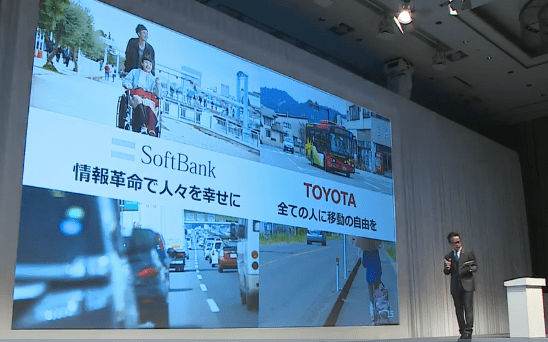Toyota Corporation and Softbank Group are joining forces to develop new mobility services targeted not just at the Japanese market but the much larger global market.
The joint venture company, MONET Technologies Corp., will link Toyota’s information infrastructure of connected vehicles and Softbank’s Internet of Things (IoT) Platform.
As the companies explained, “MONET” combines the first letters of the words “mobility network.”
Under the plan, MONET will roll out just-in-time vehicle dispatch services for local public agencies and private companies throughout Japan. These services, according to Softbank, will include on-demand transportation through regional partnerships and corporate shuttles.
By the second half of the 2020s, MONET will introduce Autono-MaaS (autonomous mobility as a service) businesses using e-Palette, Toyota's battery electric vehicle for mobility services.
The possibilities of this technology are varied, including meal deliveries vehicle where food is prepared while on the move, hospital shuttles where onboard medical examinations can be performed, and mobile offices, and many more.
The corporate structure unveiled at the launch of MONET reveals that the JV has a capitalization of JPY 2.0 billion, which will be increased to JPY 10 billion in the future. Softbank Corp. will own 50.25 percent share while Toyota Motor Corp. will get 49.75 percent share.
It said its business is in the area of on-demand mobility services, data analysis services, and Autono-MaaS businesses.
Junichi Miyakawa, Representative Director & CTO of SoftBank, will be MONET's new President and CEO.
"From Softbank's perspective, we believe that cars are ultimate IoT," said Junichi Miyakawa, Representative Director & CTO of Softbank.
"The concept of e-Pallete, on top of autonomous cars, [is that] services will be built," he said.
Toyota’s connected strategy
Shigeki Tomoyama, Executive Vice President of Toyota Motor Corporation, said in the press conference that in late 2016, Toyota unveiled a connected strategy which consists of building its Mobility Services Platform (MPSF), accelerating business innovation using big data within Toyota, and creating new mobility services in partnership with various companies.
Two years on, he said Toyota has started tie-ups with transportation firm Getaround in the United States as a mobility services platform provider.
In Asia, it has a standing collaboration with Grab, the largest ridesharing provider in Southeast Asia. The company has equipped the Grab fleet in Singapore with cooperative drive recorders and Toyota-affiliated companies have started working with Grab to provide services such as telematics-based car insurance.
Currently, it is also jointly developing automated MaaS vehicles for introduction in Uber's ridesharing service network from 2021 and an AI-based taxi-dispatch system that predicts customer demand for Japanese taxi providers.
"At the beginning of this year, the President of Toyota declared that his determination to transform Toyota from being a car company to a mobility company," Tomoyama said.



